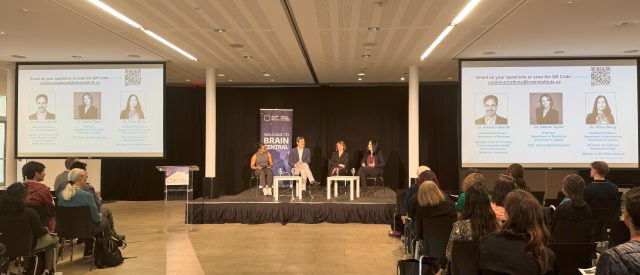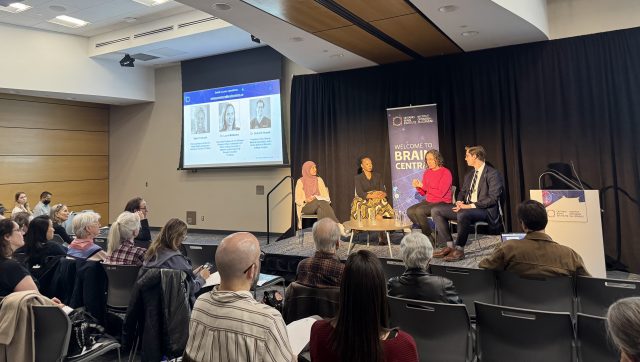“Research into gene therapy and epigenetic treatments is advancing. But to keep that progress going, we need better data-sharing, deeper testing protocols and a way to follow up with parents as discoveries are made. We need to close the gap between diagnosis and care.“
– Lloyd Rang, “Navigating the unknown: A parent’s perspective on rare genetic disorders in Canada,” The Toronto Star, June 15, 2025.
One in fifteen children are born with a rare genetic condition, many of which begin showing symptoms in early childhood and often require frequent and intensive hospital care. These disorders bring not only medical complexity, but emotional and logistical strain for families. The frank realities of this journey were powerfully conveyed in The Toronto Star through a first-person account, Navigating the unknown: A parent’s perspective on rare genetic disorders in Canada. To summarize, the author, parent Lloyd Rang, describes his daughter’s diagnostic journey with a rare condition known as ARID1B. While it’s impossible to fully understand the weight of a family’s experience, this piece brought us closer than most.
Reading it, I immediately thought of a meaningful initiative happening here at home – a partnership between OBI’s Centre for Analytics and EpiSign Inc., the Ontario-based creator of a new diagnostics test. Our collaboration is focused on a shared goal: accelerating diagnosis for children with rare genetic conditions and helping families move from uncertainty to understanding.
A growing need for better diagnostics
Traditional diagnostic methods for rare genetic disorders can be both expensive and slow. Families often face years of unanswered questions as they navigate complex referrals, repeat testing, and inconclusive results. This “diagnostic odyssey” can delay access to treatment and much-needed support services, notably during critical windows in a child’s development.
That’s why the work of EpiSign and the Centre for Analytics is so important. Together, we’re addressing one of the biggest challenges in rare disease care: how to detect these conditions earlier and more accurately, and we’re using advanced computing and artificial intelligence to do it.
How the technology works
At the heart of this innovation is the EpiSign METRIC, short for Methylation-based Episignature Testing and Reference-based Interpretation & Classification. It’s a powerful machine learning algorithm that analyzes a person’s epigenome – the chemical modifications that affect how genes are expressed – to help identify specific rare genetic conditions.
What makes our partnership stand out is how it combines innovative medical science with digital infrastructure that brings the technology to life. The Centre for Analytics provides AI expertise and secure cloud computing capabilities that make it possible to deploy the EpiSign METRIC widely and efficiently. From their offices, wherever they are, clinicians can upload complex patient files to the platform, run the algorithm, and receive results far faster than traditional methods allow.
In short: more files get processed and with increased speed, both of which help children get diagnosed sooner and receive the care they need without unnecessary delays.
A made-in-Ontario solution with global promise
This partnership reflects a broader and deeply promising trend: the responsible use of AI and data science to address real-world challenges. For the past two years, the focus of the Centre for Analytics has been translating advanced technologies into tools that improve lives – and this collaboration with EpiSign is just one example.
The impact is already tangible. By accelerating diagnosis, this solution helps reduce the uncertainty families face. It shortens the path to effective treatments, it provides clinicians across the globe with tools that make their work faster and more precise, and it allows us to foster homegrown innovations in our own backyard.
Putting families first
Dr. Bekim Sadikovic, EpiSign Founder and Chief Scientific Officer, was kind enough to share the following.
“At EpiSign, our mission has always been to bring clarity to families navigating the uncertainty of rare genetic conditions. Through our partnership with the Ontario Brain Institute, we’ve been able to harness the power of epigenetics and artificial intelligence to deliver faster, more accurate diagnoses for children across Ontario and beyond. This collaboration is a testament to what can be achieved when science, technology, and patient-centered care come together – and it reflects the global potential of homegrown innovation to transform lives.”
This partnership is a powerful reminder that when science, compassion, and technology intersect, real progress is possible. Through the collaboration between the Centre for Analytics and EpiSign, we are not only pushing the boundaries of medical diagnostics but also reducing the uncertainty that so many families face. This is what using AI for healthcare advancements can look like: supporting the work of healthcare professionals, accelerating access to care, and ultimately, improving the lives of people in the province of Ontario and beyond.
Support the future of brain health – learn how you can help OBI transform lives.



